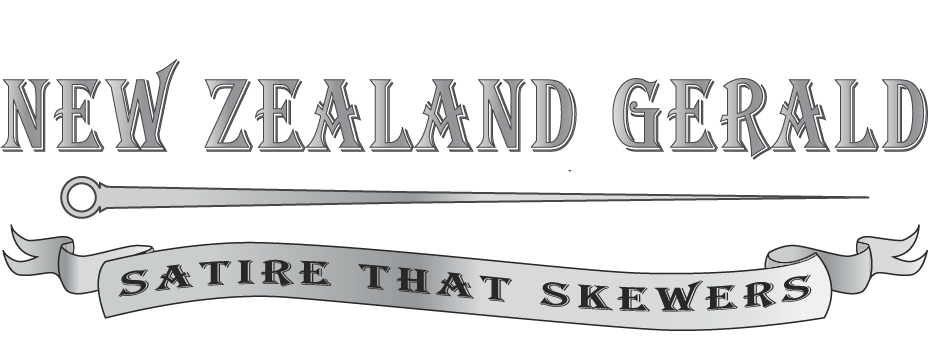A New Zealand
Dominic Fahey, author of the eagerly anticipated Healing Hitler: A Reiki Approach to Understanding the Founder of the Third Reich, is a writer unlike all the others I’ve met in a career spanning 20 years. For one thing, he claims not to have written or typed a single word since he burned down his high school at the tender age of 13.
“Ah, those were the days,” recalls Fahey. “Nobody could prove it was me, of course. It was while I was watching the fire from a secure vantage point that I had a sort of epiphany – I realized that I had to become a great dictator.”
And so began Fahey’s life-long habit of forcing people in his vicinity to write down everything he says, whenever he gets the urge to oralize. It wasn’t long before he acquired the nickname “Little Hitler”, which could not be more appropriate: Fahey is 5’ 2” and, when dictating, gesticulates in a style that instantly brings to mind the Scourge of the Jews.
Fahey admits to having what he calls a “not soft but not hard either” spot for Austria
“I was astonished to find that no one had approached Hitler from the Reiki angle before,” Fahey says. “My book proves that Reiki is the key to understanding the Führer. I discovered some amazing things during my research trip to Berlin
Fahey digresses for a moment to reveal that his own mother is an extraordinarily tall woman. Gertie Fahey is 6’ 5” in her nylons, he tells me, and used to have a job cleaning the eaves of Grey Lynn villas.
“Poor old mum has never really been altogether there up top,” he chuckles. “In her 50s she started cleaning people’s eaves without asking them first. Caused all sorts of trouble. In the end I had to put her in a home. Have you ever been to Jervois Rest Home & Hospital? Their eaves are the cleanest eaves you’ll ever see. They have to tie her down at night or she’d be cleaning them 24/7, bless her size 16s.”
Fascinated by that image, I asked him to explain what a Big Mother complex was.
“It’s quite simple really. Basically Hitler loved his mother, Klara, madly. When she died of breast cancer on December 21st, 1907, young Adolf was devastated. The attending doctor said he had never seen anyone so overcome with grief.
The exact contents of Healing Hitler will remain under wraps until August 2nd, the 77th anniversary of Hitler becoming Führer of Germany. I asked Fahey what he thought readers would make of the book, the second in his “Great Dictators” series, which began 5 years ago with Ministering to Mussolini: How Benito Benefited from Chinese Medicine.
“They’ll love it,” Fahey says with the conviction of the dictators whose dependencies on alternative medicine he has made it his life’s work to bring to the light.
“Those of them who practise Reiki will be able to get a feel for the book via an exclusive download from the mysterious atmosphere,” he concluded with a wink.
